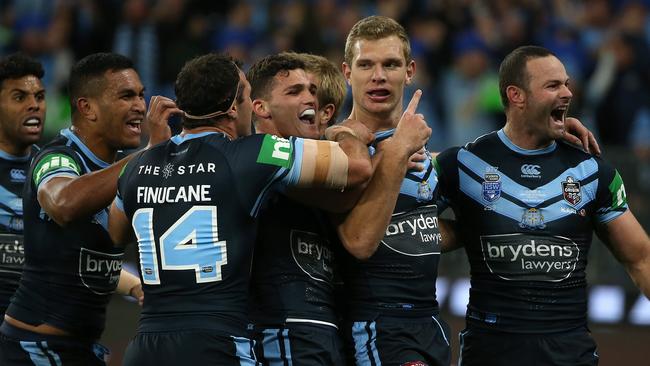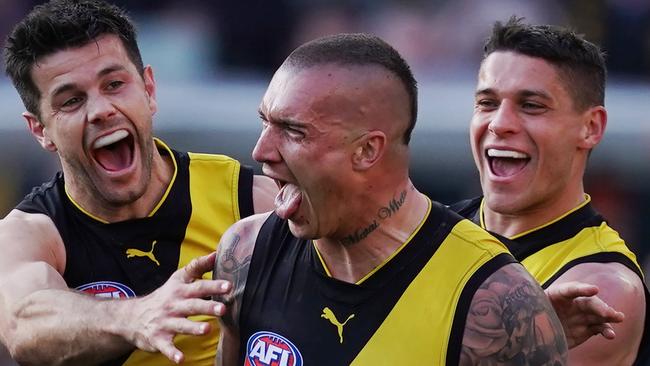NRL, AFL put on notice over rights money as sun setting on mega television deals
As codes deal with enormous financial losses, with little to no TV rights money without games being played, the AFL and NRL ‘should not expect mega broadcast deals in the future’. But there are still ways they can succeed.

Teams
Don't miss out on the headlines from Teams. Followed categories will be added to My News.
COVID-19 may have signalled the death of the multi-billion dollar TV sports rights deal.
As codes deal with enormous financial losses because of the pandemic, with little to no TV rights money without games being played, Global Media & Sports director Colin Smith said the AFL and NRL should not expect a bigger deal from Australian broadcasters in the future.
Smith said all the football codes needed to up their fan engagement, noting the industry pre-COVID-19 was already needing to “adapt and create” their products to attract and keep the next generation of supporters.
Relive classic NRL matches from the 60s to today on KAYO SPORTS. New to Kayo? Get your 14-day free trial & start streaming instantly >

Smith said the pandemic has triggered a “reset button”.
“It’s going to be a complete reset,” Smith said.
“It puts into question the multi-billion dollar deals. Future deals have got to come back to true economics either of subscribers or TV viewership. Those deals are going to have to stand on what will provide a commercial return for the broadcaster.”
“Sports and broadcasters have got to do more to really engage with the fans. I think that’s been missing and they’ve got to do more to get more people watching it and interested in it and follow it.”
“The AFL has done a better job with this. Just look at their club memberships. The others? They have huge work to do, to re-engage, to bring back real rivalries either attending games or watching on TV or through their smartphone.”
Smith suggested the National Rugby League needed to be more innovative and believes it needed to start season 2021 with a bang.
“If I was running the NRL I would kick off my season with State of Origin,” Smith said.
“That is the largest broadcast product in Australia bar none. That gets approximately 11 million viewers each year. Why not kick it off with a great start? A State of Origin match. And then restart the club competition with that impetus. Your fans have impetus.
“State of Origin is even big in Melbourne. It is seen as an iconic sporting event in Australia. If you look at cumulatively, it is bigger than the NRL or AFL grand final.”
Smith said all broadcasters were challenged pre-COVID-19 with the rise of streaming services like Netflix, Amazon and Stan attracting viewers.

“Millennials and younger are not watching linear TV – they are watching sport and other content differently,” Smith said.
“The fragility of the sports system – that is spending up to watch you earn – when the piggy bank stops, then the whole economic system is unbelievably challenged.”
In 2015, the AFL struck a colossal new six-year, $2.508 billion broadcast rights agreement with Channel 7, Foxtel and Telstra. The deal runs from 2017 to 2022.
The NRL secured a $1.8 billion deal with the Nine Network, News Corp Australia, Foxtel, and Telstra for five years from 2018.
Smith said the possible seasons being placed on hold – or even not restarting because of COVID-19 pandemic – places the codes in a perilous state with some fans.
“Fans might say, I haven’t missed it is that much,” Smith said.

“What they’ve got to do now is engage them and then have some absolutely fantastic games that re-engage with the fans.”
Rugby Australia, who is the only major code without a broadcast rights deal beyond this year, has some challenges ahead.
“This needs to be the reset and re-engagement button for rugby,” Smith said.
“When I say reset. The critical question is what should SANZAAR look like in the future?
How will rugby in Australia re-engage and grow their fan base that will recommit their broadcast partners such as Foxtel.
“What can a rebuild refocused Australian rugby look like, somewhere in the future across the Wallabies, Super Rugby, Shute Shield/Hospitality Cup, Sevens and the emerging women’s rugby”.

